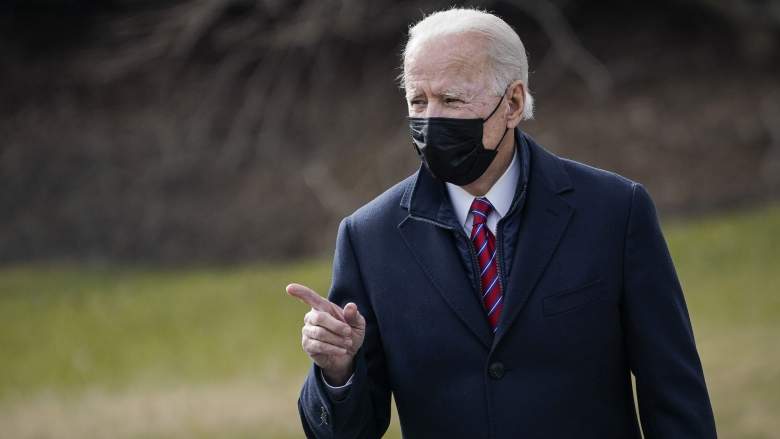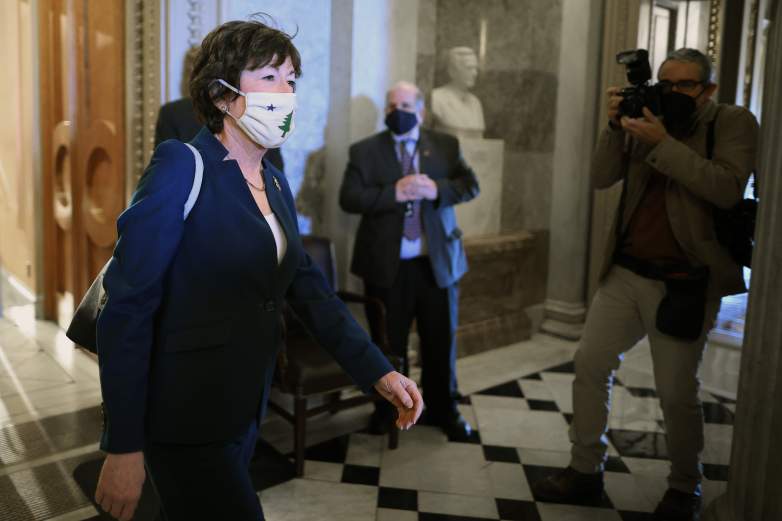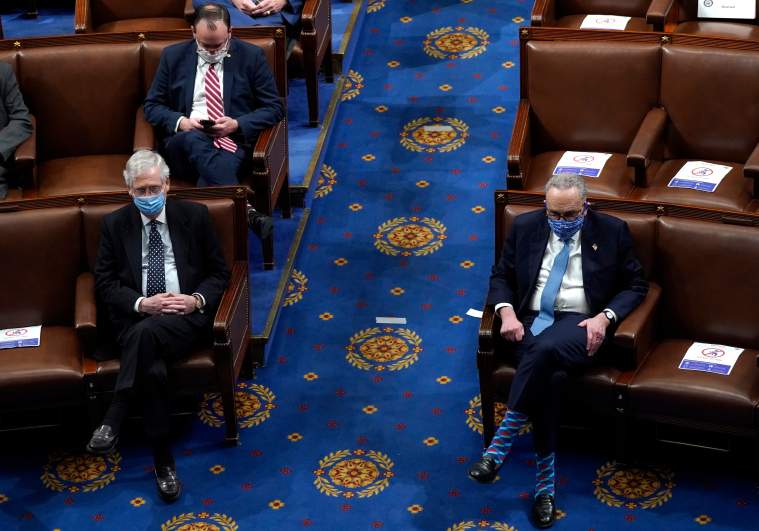
Getty U.S. President Joe Biden walks to Marine One on the South Lawn of the White House on January 29, 2021 in Washington, D.C.
A group of 10 Republican senators are planning to propose a compromise deal to President Joe Biden on the next round of coronavirus relief, including a third round of stimulus checks, offering a $600 billion COVID-19 package instead of Biden’s $1.9 trillion plan. The group of GOP senators, led by Maine Senator Susan Collins, said in a January 31, 2021, letter that they would unveil their proposal on Monday, February 1. Collins and the others plan to appeal toward Biden’s campaign promise to make bipartisan deals.
The senators wrote in the letter, “As you proclaimed in your Inaugural Address, overcoming the challenges facing our nation ‘requires the most elusive of things in a democracy: Unity.’ Heeding that important call, we welcome the opportunity to work with you in a bipartisan manner to combat the COVID-19 virus and provide continued support to families struggling during the pandemic.”
The letter is signed by Collins, Alaska Senator Lisa Murkowski, Louisiana Senator Bill Cassidy, Utah Senator Mitt Romney, Ohio Senator Rob Portman, West Virginia Senator Shelley Moore Capito, Indiana Senator Todd Young, Kansas Senator Jerry Moran, South Dakota Senator Mike Rounds and North Carolina Senator Thom Tillis.
Biden responded to the letter Sunday night, saying in a statement from Press Secretary Jen Psaki that he talked to Senate Majority Leader Chuck Schumer and House Speaker Nancy Pelosi and is “grateful” Congress plans to take action on his plan. Psaki said Biden has invited Collins and the nine other GOP senators to the White House “for a full exchange of views.”
Psaki said, “With the virus posing a grave threat to the country, and econimic conditions grim for so many, the need for action is urgent, and the scale of what must be done is large. The American Rescue Plan — including $1,400 relief checks, a substantial investment in fighting COVID and reopening schools, aid to small businesses and hurting families, and funds to keep first responders on the job (and more) — is badly needed. As leading economists have said, the danger now is not in doing too much: it is in doing too little. Americans of both parties are looking to their leaders to meet the moment.”
Schumer said in a January 28 speech that Democrats would move forward with its push to pass another COVID-19 stimulus package and said there was no interest from Congressional Democrats to pass a smaller proposal.
“Our preference is to make this important work bipartisan — to include input, ideas and revisions from our Republican colleagues or bipartisan efforts to do the same,” Schumer said during his speech. “But if our Republican colleagues decide to oppose this urgent and necessary legislation, we will have to move forward without them.” Schumer added that Democrats want a “big,” “bold” and “robust,” bill and said they have learned lessons from the 2009 financial crisis, when Schumer said Congress was “too timid” to pass what was needed. He said Democrats do not want to “repeat the mistakes.”
The Biden administration is hoping to quickly get out $1,400 in direct payments. That amount would combine with the $600 stimulus checks that came as part of a $900 billion COVID-19 relief bill signed by former President Donald Trump in late December 2020. On Friday, January 30, Biden said during a speech, “We have learned from past crises that the risk is not doing too much. The risk is not doing enough.” When Biden announced his $1.9 trillion “American Rescue Plan” on January 14, he said, “We will finish the job of getting a total of a $2,000 in cash relief to people who need it the most. The $600 already appropriated is simply not enough.”
The 10 GOP Senators Call for ‘More Targeted Assistance,’ Through $1,000 Direct Payments

GettyRepublican Senator Susan Collins, of Maine, in January 2021.
The 10 GOP senators wrote in the letter to Biden, “In the spirit of bipartisanship and unity, we have developed a COVID-19 relief framework that builds on prior COVID assistance laws, all of which passed with bipartisan support. Our proposal reflects many of your stated priorities, and with your support, we believe that this plan could be approved quickly by Congress with bipartisan support. We request the opportunity to meet with you to discuss our proposal in greater detail and how we can work together to meet the needs of the American people during this persistent pandemic.”
The letter addresses direct stimulus checks by saying, “Our proposal also includes economic relief for those Americans with the greatest need, providing more targeted assistance than in the Administration’s plan. We propose an additional round of economic impact payments for those families who need assistance the most, including their dependent children and adults.”
The Republican senators did not provide details of what their plan would call for in terms of stimulus checks. Biden’s proposal calls for $1,400 direct payments. But in an interview on Fox News Sunday, Senator Bill Cassidy said the plan would include $1,000 direct payments. The amount would vary based on income. Cassidy did not specify what the income levels would be. The $600 stimulus checks were sent to those who earned $75,000 or less in 2019 individually or $150,000 or less as a couple, with an additional $600 sent for each child in a family. Reduced checks were also sent to those who made $75,001 to $87,000 in 2019.
“We are very targeted, we’re targeted to the needs of the American people,” Cassidy said on Fox News Sunday. “Treating our tax dollars as if they are our tax dollars and not just money to spend and putting it where we need to come out of the pandemic.” About the direct payments, Cassidy said, “Ours is targeted, we have $1,000 and it begins to phase out. If you notice, there’s been very good analysis that above a certain income level that money is not spent. Now it may pay down debt, and we’ve seen credit card delinquency go down, mortgage delinquency go down, savings rates go up. But that doesn’t stimulate the economy. It’s good, but it doesn’t stimulate the economy. Our money goes to that income level where we know it will stimulate the economy and theoretically that’s what they actually want.”
According to Nexstar Media Group, the Biden administration has indicated it is open to negotiating which Americans receive the check and could allow for the stimulus to be more directly targeted to lower-income people.
The letter added, “Our plan also includes extending enhanced federal unemployment benefits at the current level and fully funding your request for nutrition assistance to help struggling families,” and “We share your goal of providing additional assistance for our small businesses. Included in our plan are additional resources to help our small businesses and their employees through the successful Paycheck Protection Program and the Economic Injury Disaster Loan Program.”
The senators wrote, “In 2020, Members of the House and Senate and the previous Administration came together on a bipartisan basis five times to direct the resources of the federal government toward combatting the urgent COVID-19 pandemic. Each of these laws received the support of members from both political parties. With your support, we believe Congress can once again craft a relief package that will provide meaningful, effective assistance to the American people and set us on a path to recovery. We recognize your calls for unity and want to work in good faith with your Administration to meet the health, economic, and societal challenges of the COVID crisis.”
Biden Economic Adviser Brian Deese Said the White House Is ‘Uncompromising When It Comes to the Speed That We Need to Act at to Address This Crisis’
On CNN’s State of the Union on Sunday, Biden economic adviser Brian Deese responded to the letter from the Republican senators, saying, “We’ve received the letter and we certainly will be reviewing it. … What I will say, is the provisions of the president’s plan, the American Rescue Plan, were calibrated to the economic crises that we face.” He said the plan was structured to answer, “how are we going to provide direct relief to those families and those businesses that are struggling the most?”
Deese, the director of the National Economic Center, said the administration is, “certainly open to input from anywhere where we can find a constructive idea to make this package as effective as possible. But the president is uncompromising when it comes to the speed that we need to act at to address this crisis.”
When asked about targeted stimulus checks, Deese said, “We want to get cash into the pockets of the families, and the businesses, who need it the most. That’s why we have unemployment extension insurance for people that have lost their jobs through no fault of their own, why we have support for nutrition and hunger, support to avoid families being evicted from their home and put out on the street and also the $1,400 checks.”
Deese continued, “We’re open to looking at how to make the entire package effective at achieving it’s objective, including providing support to families with children, providing direct child tax credits to families that have children and who have been hit the hardest in the crisis. That’s certainly a place we’re willing to sit down and think about are their ways to make the entire package more effective.”
Deese added, “When we think about the targeting, we think this plan is really targeted to provide cash into the pockets of the people who are most in need.”
Support From the 10 GOP Senators Would Allow for the Bill to Be Passed Through Regular Senate Procedures Instead of Using Budget Reconciliation

GettySenate leaders Mitch McConnell, left, and Chuck Schumer.
According to The Washington Post, a compromise relief bill with the 10 Republican senators would allow for the package to be passed through normal Senate procedures instead of through the budget reconciliation process. The Senate is split 50-50. Democrats would have enough votes to approve the package through budget reconciliation, but would need at least 10 GOP votes for the normal process.
The Post wrote, “Democrats are planning to skirt the 60-vote requirement using special budget rules that would allow the Biden package to pass with a simple majority vote. Democrats control the Senate because Vice President Harris can cast tie-breaking votes. Democratic aides said the GOP proposal would not change their plans to move forward with the budget bill this week that would set the stage for party-line passage of Biden’s plan.”
Jared Bernstein, another Biden economic adviser, said on Fox News Sunday, they are willing to negotiate, but “The cost of inaction is extremely high … Glad to hear from this letter that they are onboard, but we have to learn a lot more about it. Right now we are in a position where delay and inaction are the enemy of moving forward. … The American people really couldn’t care less about budget process, whether it’s regular order bipartisanship, whether it’s filibuster, whether it’s reconciliation, they need relief and they need it now.”
READ NEXT: Man Terrorizes Gas Station Worker in Islamophobic Rampage